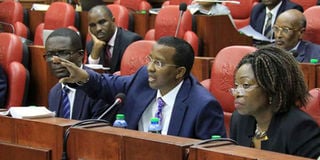Replacing officials no cure for electoral woes

Front, from left: Independent Electoral and Boundaries Commission Chief Executive Officer Ezra Chiloba, chairman Isaac Hassan and vice-chairman Lilian Mahiri-Zaja before a joint parliamentary select committee on the electoral body at Parliament in Nairobi on August 2, 2016. PHOTO | JEFF ANGOTE | NATION MEDIA GROUP
What you need to know:
- The conduct of some IEBC commissioners contributed to erosion of public trust and confidence that the electoral body could credibly discharge its duties.
- Bundling the current IEBC commissioners out of office and replacing them with new ones will not, on its own, be the panacea for the massively dented reputation of the IEBC.
- Our sense of apathy and indifference to corruption and its attendant vices might explain why we are where we are more than five decades after independence when we could have made so much progress.
After weeks of street protests by opposition leaders and their supporters demanding the removal of Independent Electoral and Boundaries Commission (IEBC) officials, in a somewhat surprising move, the government finally yielded to pressure.
This was in stark contrast to the weeks leading up to the ceasefire. The tough-talking interior Cabinet secretary, Joseph Nkaissery, had branded the protests an attempt by the opposition to grab power through the back door and ordered police to firmly deal with the protesters.
In a familiar fashion, police responded with savage brutality. When the protests finally ended, six lives were needlessly lost and property destroyed.
A gentleman’s agreement was reached between the opposition and the government on how to ease the commissioners out of office.
For a moment, it seemed as though the opposition had scored a major victory, but a close analysis suggests otherwise.
Bundling the current IEBC commissioners out of office and replacing them with new ones will not, on its own, be the panacea for the massively dented reputation of the IEBC.
The unconscionable conduct of some IEBC commissioners greatly contributed to erosion of public trust and confidence that the electoral body could, in its current form and composition, fairly and credibly discharge its duties.
The conduct of some of the IEBC commissioners is a microcosm of our society and a damning indictment of the state of affairs in government institutions and entities. Private enterprise is not immune either. Often corruption, nepotism, and tribalism trump merit and fairness.
We know what happens to even the noblest, most well-intentioned, credible, and respected individuals appointed to positions of responsibility and tasked to bring about change and advance common good in an environment where corruption, tribalism, and nepotism are deeply rooted.
POWERFUL CARTELS
There is a plethora of examples, including former anti-corruption tsars John Githongo, Aaron Ringera, and PLO Lumumba. They all failed to deliver the change that so many Kenyans hoped for.
They stood no chance against vicious and incredibly powerful cartels with deep connections in the high echelons of power that will do anything and everything to protect the structures and systems whence they have and still continue to benefit.
That is why I regard as a contradiction the wildly optimistic expectation by the opposition that the simple act of changing IEBC commissioners would lead to future free, fair, and credible elections in a society whose fabric reveals a near-enduring shortage of fairness, credibility, and transparency.
Often the problem with addressing symptoms and not the root causes of a problem, no matter the resources committed to such an effort, is that it all counts for naught because the illness returns sooner or later.
It is evident that what is needed to disenthrall our country from the choking grip of corruption, which threatens to condemn a whole generation to hopelessness, is not effecting reactive changes but a radical and seismic shift in attitude and culture to make them averse to the triple maladies of corruption, nepotism, and tribalism.
In many ways, our sense of apathy and indifference to corruption and its attendant vices might explain why we are where we are more than five decades after independence when we could have made so much progress.
I submit that one thing is certain: if we do not all rise to the occasion, our great country, with so much unrealised potential, will forever be caught in a mouse reel, appearing to make progress but in actual sense making none at all.
Mr Nyasani is a political and security analyst; [email protected] or @gitaanyasani




